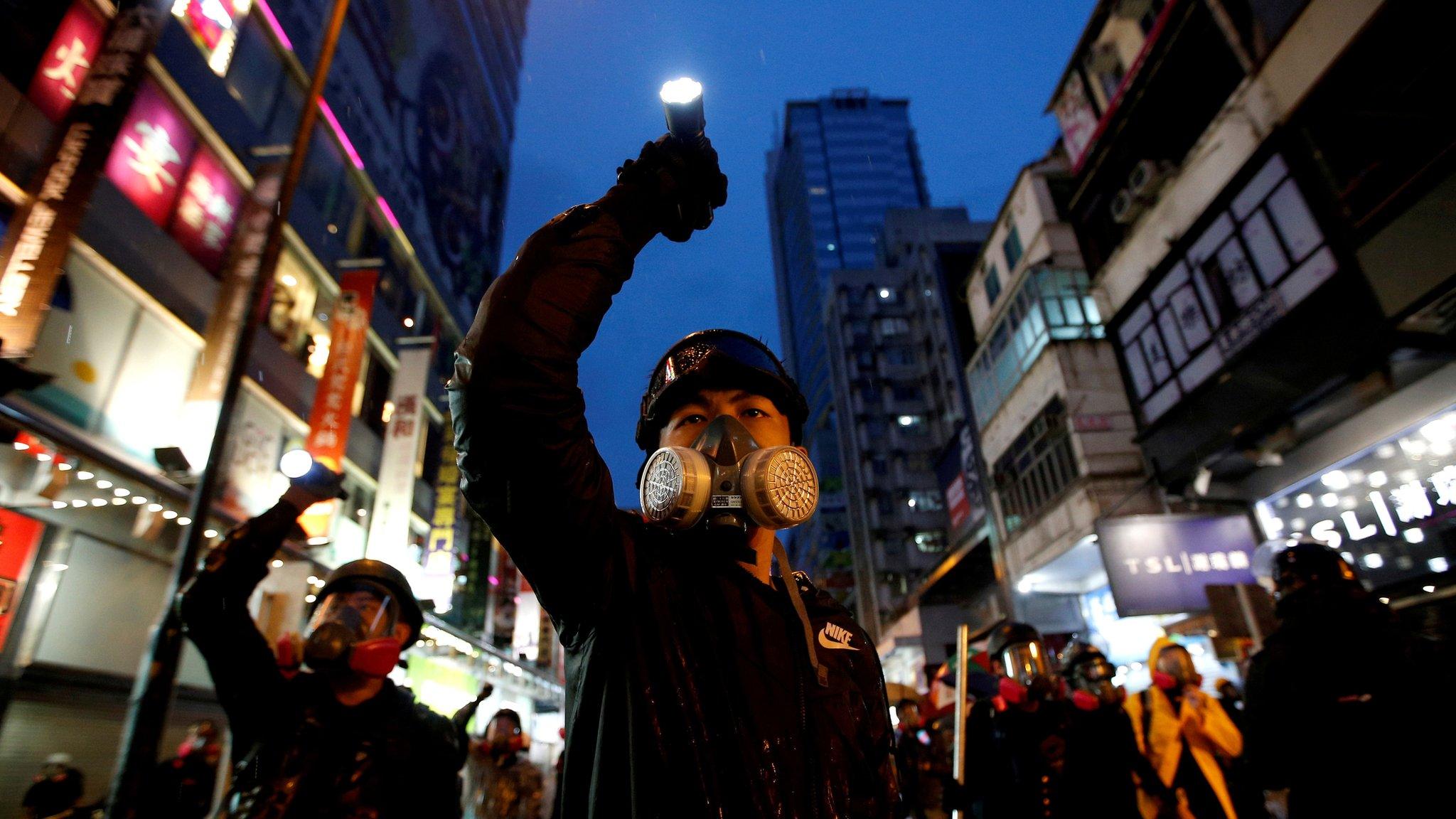National security law: Hong Kong rounds up 53 pro-democracy activists
- Published
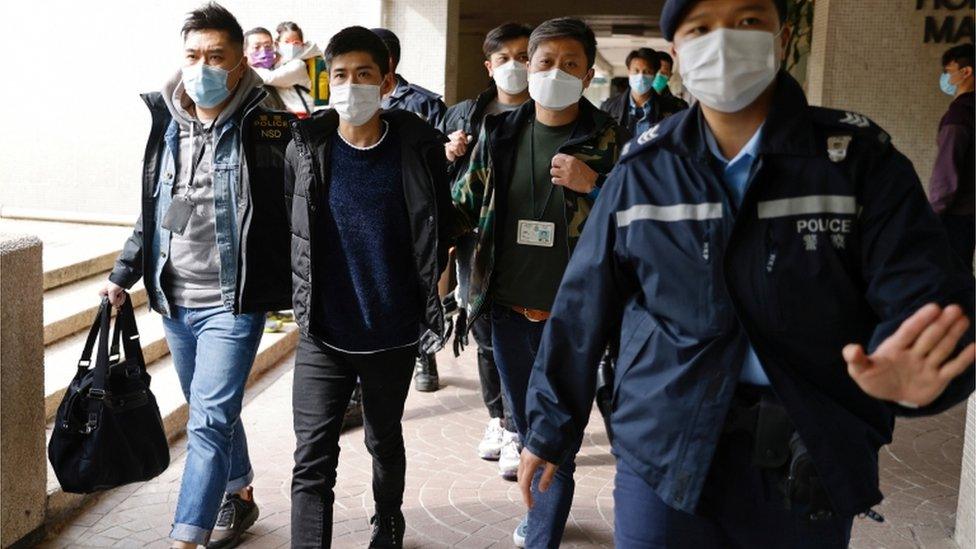
Lester Shum was first barred from running for office, then arrested
More than 50 of Hong Kong's most prominent pro-democracy activists and politicians have been arrested in the biggest crackdown since China imposed a draconian security law last year.
About 1,000 police took part in morning raids on 72 premises across the city.
Those held helped run an unofficial "primary" to pick opposition candidates ahead of postponed 2020 elections.
They are accused of trying to "overthrow" the government. Activists say the new law aims to quash dissent.
China's government imposed the legislation on the semi-autonomous territory in June, saying it was necessary to curb months of sometimes violent pro-democracy protests.
Beijing defended Wednesday's arrests, with Foreign Ministry spokeswoman Hua Chunying saying they were needed to stop "external forces and individuals [colluding] to undermine China's stability and security".
But the crackdown appeared to confirm the fears of many who warned about the reach of the law, with Amnesty International saying the arrests are "the starkest demonstration yet of how the national security law has been weaponised to punish anyone who dares to challenge the establishment".
Who was detained?
Dozens have been arrested under the security law since it was enacted in June, but never have so many been rounded up at the same time as on Wednesday, which marked a major escalation in the crackdown and sent a chill through pro-democracy figures.
Police fanned out around the city and in early morning raids detained 53 people who represent a who's who of democratic forces in the former British colony, young and old. They include:
long-established opposition figures James To, Lam Cheuk-ting, Claudio Mo and Benny Tai, one of the initiators of the primaries
young pro-democracy campaigners Lester Shum, Gwyneth Ho, Tiffany Yuen and Jeffrey Andrews
Human rights lawyer John Clancey, a US citizen
two academics behind the primaries strategy
13 candidates from the primaries
Police also searched the home of already detained activist Joshua Wong, as well as three news outlets.
Apple Daily and Stand News, which had co-organised election forums for the primaries candidates, and In-Media, which ran ads around the primaries, were ordered to hand over information.
Mr Clancy, a veteran legal activist and long-time resident of Hong Kong, is chairman of the Asian Human Rights Commission and the first US citizen held under the new law. He was detained when police searched the offices of law firm Ho Tse Wai & Partners where he works.
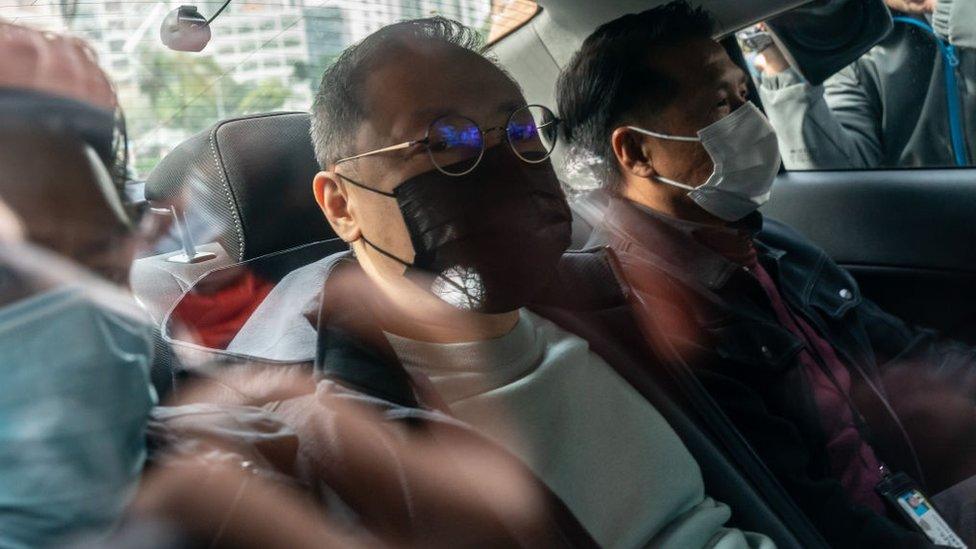
Benny Tai was one of the architects of the primaries
Hours after the dawn arrests John Lee, Hong Kong's security secretary, confirmed a group of people had been arrested as part of an operation targeting those suspected of "overthrowing" the city's government.
The government will not tolerate "subversive" acts, he said, speaking at the city's Legislative Council.
If charged under the new national security law, the detainees could face life in prison.
The BBC's Danny Vincent in Hong Kong says the legislation has spread what activists call "white terror" across the city. It has all but silenced the street protest movement and led to a growing number of activists fleeing the territory.
When authorities introduced the law, they claimed it would target only a small number of activists, but the wide-ranging nature of Wednesday's operation has led many to fear the authorities are now trying to eliminate the entire opposition camp, he says.
What were the primaries?
In July last year, an alliance of opposition parties ran independently organised primaries to see which of their candidates had the best chances in September's election for the Legislative Council (LegCo), Hong Kong's parliament.
More than 600,000 people voted in the primaries. The election was later postponed, with officials citing concerns over the coronavirus pandemic as the reason for the delay.
The opposition groups had hoped that winning more seats would give them enough power to block government proposals and increase pressure for democratic reforms.
Hong Kong's leader Carrie Lam had warned at the time the primaries could amount to subversion, external if the candidates intended to obstruct government policies through their election.
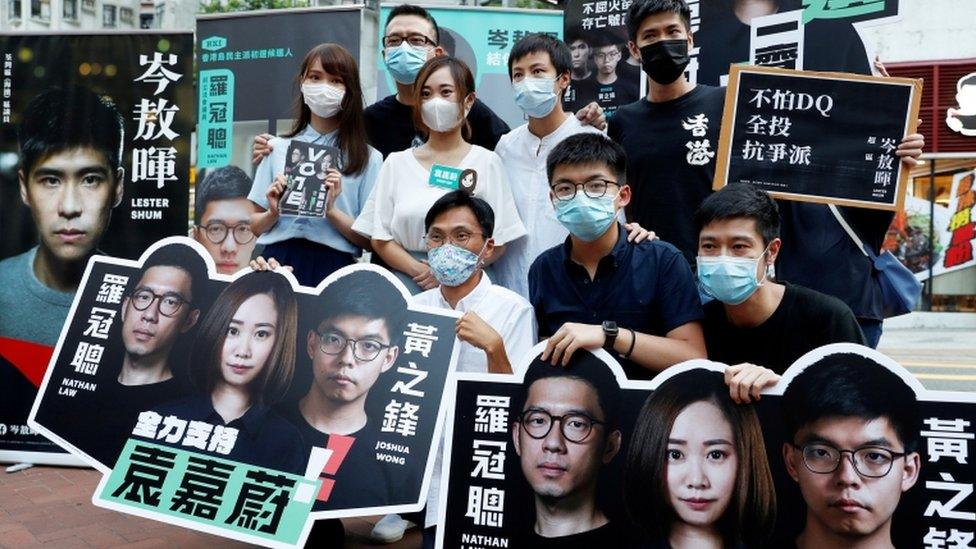
In July, Joshua Wong (on right in poster) and Lester Shum (on left) had still hoped to run for LegCo
Several of the opposition figures planning to stand in the LegCo election were later disqualified from running, including Joshua Wong, Lester Shum and Gwyneth Ho, a former journalist who rose to prominence covering the 2019 protests.
Most of the opposition lawmakers in the current LegCo resigned in November in protest at four of them being dismissed from parliament.
What's been the reaction?
The crackdown has stunned people in Hong Kong.
"Seeing the news today I feel completely shocked. I feel very disappointed. It seems that such major things are happening in Hong Kong and there's nothing we can do about it.
"I feel very unhappy and it seems that even during the epidemic the government can still do so many things to terrorise people," Mannie Ng, a Hong Kong resident, told Reuters news agency.
The arrests have been widely condemned internationally.
Antony Blinken, President-elect Joe Biden's pick as next US Secretary of State, said they were an "assault on those bravely advocating for universal rights".
"The Biden-Harris administration will stand with the people of Hong Kong and against Beijing's crackdown on democracy."
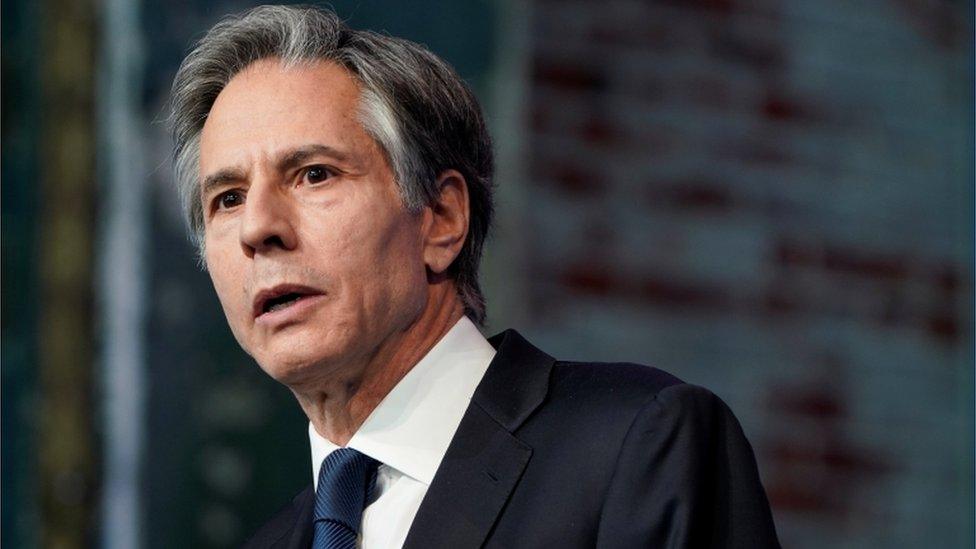
Antony Blinken said Washington will stand with Hong Kong
UK Foreign Secretary Dominic Raab said the arrests were a "grievous attack" on rights applied under the joint declaration signed with Britain when the territory was handed over in 1997.
He said it demonstrated the national security law was "being used to crush dissent and opposing political views".
Chris Patten, the territory's last British governor, said: "The Chinese Communist Party has further turned the screw in Hong Kong. Liberal democracies around the world must continue to speak out against the brutal destruction of a free society."
Maya Wang, China specialist at Human Rights Watch, said China was now "removing the remaining veneer of democracy in the city".
"Beijing once again has failed to learn from its mistakes in Hong Kong: that repression generates resistance, and that millions of Hong Kong people will persist in their struggle for their right to vote and run for office in a democratically elected government," she said.
Nathan Law, a prominent Hong Kong activist who fled the territory in July last year, said the widespread arrests had taken "the suppression of political freedom and freedom of speech" to "another level".
"Anyone who is still defending the National Security Law and making peace is the enemy of Hong Kong people."

Street protests a 'distant memory'
By Robin Brant, BBC News, Shanghai
Beijing sees "vicious plans" to topple Hong Kong's semi-autonomous government. Supporters of the dozens arrested see another crude crackdown on what's left of the territory's nascent democracy.
Despite co-ordinated international criticism, with some targeted retaliation, led by the US and the UK, the authorities have enthusiastically embraced their powers under the new national security law passed last year.
How these latest arrests come under that jurisdiction is not yet clear. But it's worth remembering this law is ambiguous and sweeping in its definition, targeting anyone, anywhere in the world.
The street protests are now a distant memory. Some prominent figures have fled to friendly countries, almost certainly never to return.

What is Hong Kong's security law?
The security law punishes what China broadly defines as secession, subversion, terrorism and collusion with foreign forces with up to life in jail.
It has been widely criticised by rights groups and Western nations as effectively curtailing dissent.
A former British colony, Hong Kong was handed back to China in 1997. It retained more civil and political freedoms than the mainland has.
Activists say that in recent years, these freedoms have been eroded. Pro-democracy protests have often led to violent clashes with police.
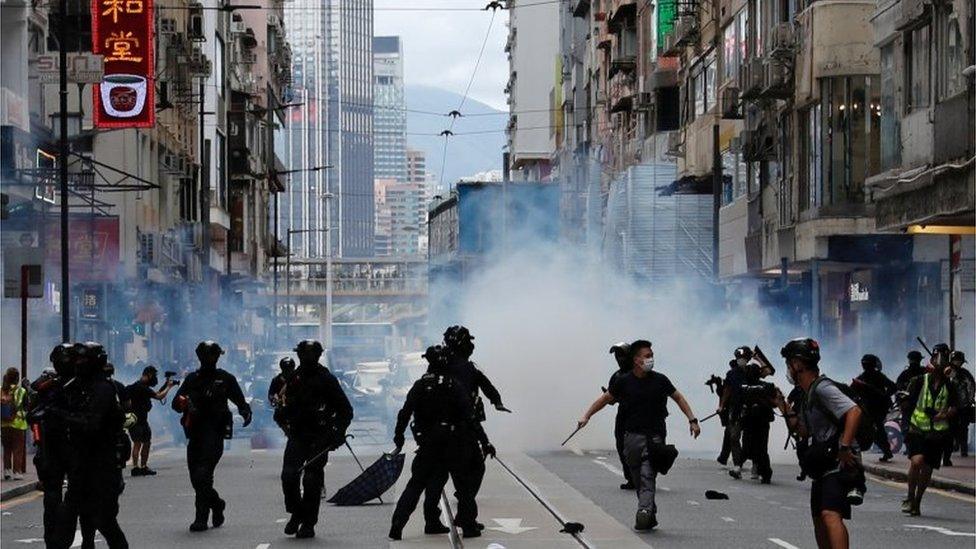
Pro-democracy protests have rocked Hong Kong for years
The Chinese government has defended the law, saying it will help return stability to the territory, which has been shaken by pro-democracy protests, and bring it more into line with the Chinese mainland.
After the law was introduced, a number of pro-democracy groups disbanded out of fears for their safety and several high profile court cases under the security law have started.
Media tycoon Jimmy Lai has been charged under it as well as several activists who tried to flee the territory by boat last August.
Jimmy Lai told the BBC he would not give in to intimidation
- Published3 January 2021
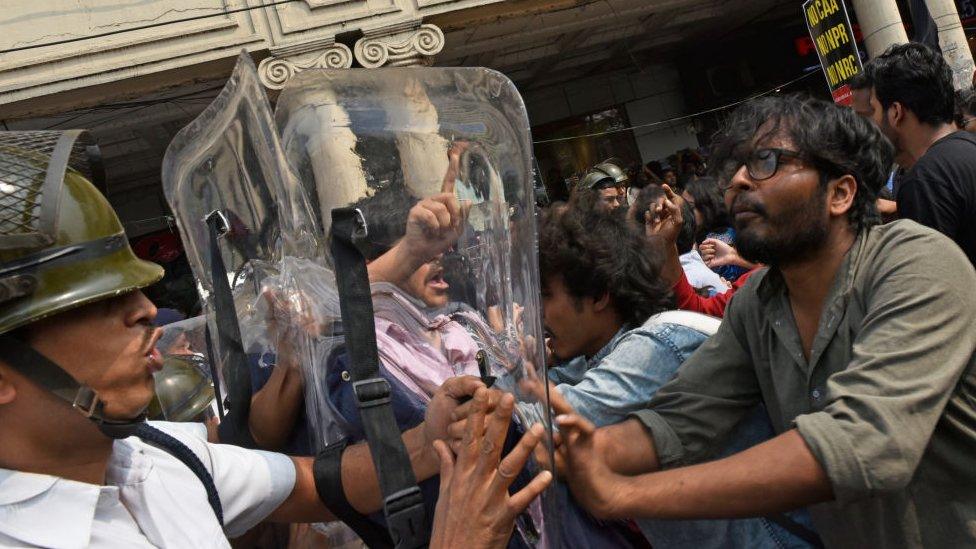
- Published31 December 2020
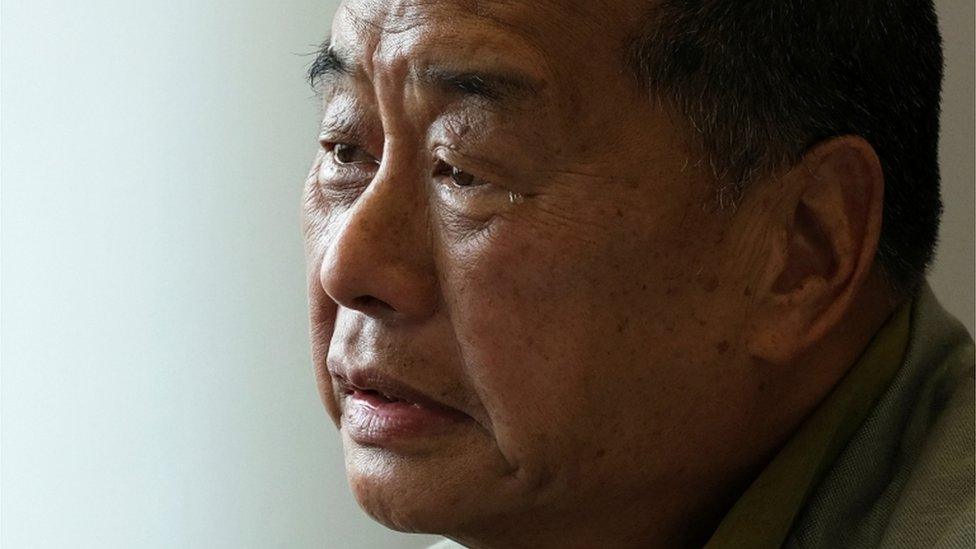
- Published12 November 2020
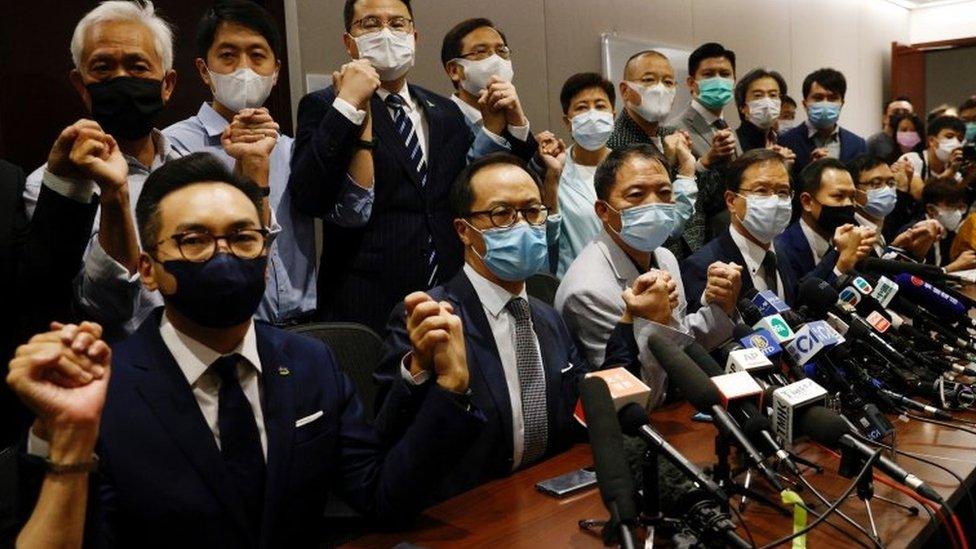
- Published12 November 2020
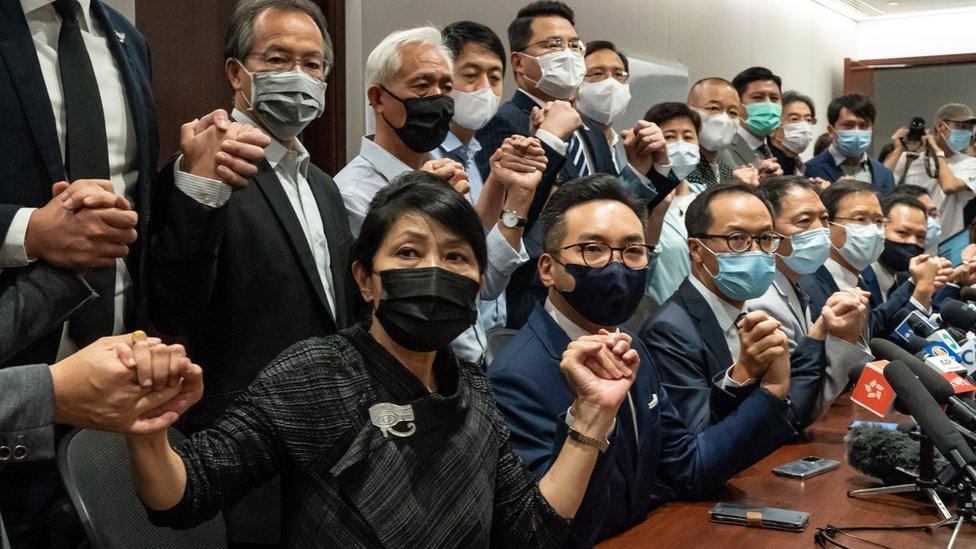
- Published19 March 2024
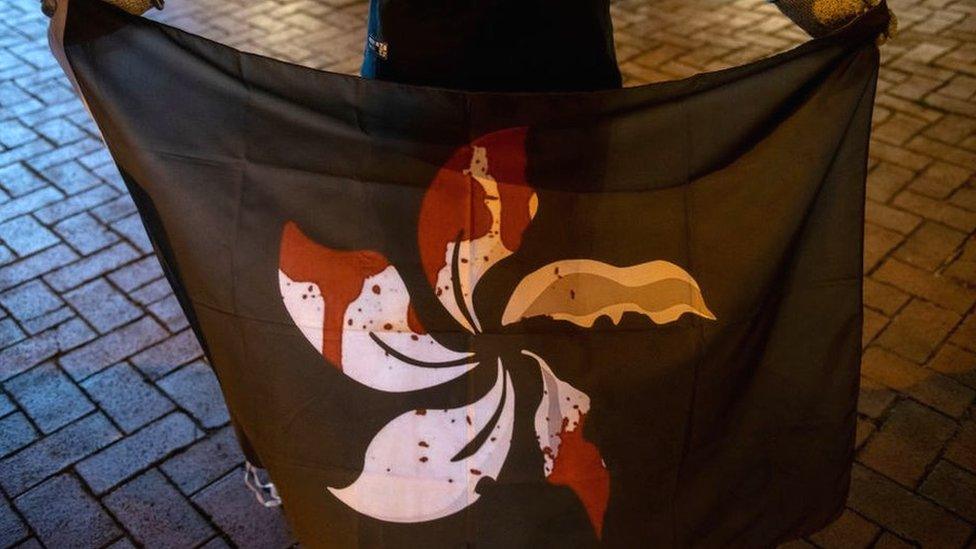
- Published21 May 2020
